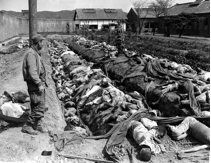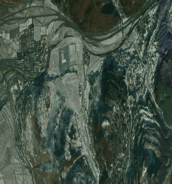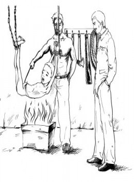Death Camps in Korea
Zi Rosemond
The issue of death camps in North Korea is oddly, a topic that few recognize. These political prisons mirror that of the concentration camps and gulags during the reigns of the Holocaust and Soviet Union. An estimated 200,000 of Northern Korea’s population is said to be held in these camps and a reported 400,000 people have died in these detention centers due to disease, starvation, torture and execution. Six of the largest camps are visible to satellites, though the country continues to deny that they exist. On the face, the mere existence of these camps is an extreme violation of human rights, as are tortured and killed on a daily basis as part of North Korea’s “cleansing process.”
From 1933 to 1945 concentration camps used in the Holocaust held millions of Jews during the time of Nazi occupation. Though these camps were eventually all but wiped out after WWII, many still stand as a tool for education against the violation of human rights. Shortly after WWII was ended the UN signed the declaration of Human Rights, stating that the events of the Holocaust, including the tools the Nazi’s used to inflict terror throughout Europe, would never again be tolerated. The political camps of North Korea have existed 12 times as long than those used in the Holocaust and are still in use today despite the Korean government’s insistence that no such prisons exist inside the territory of the heavily isolated country (Harden, 4).
Those who are sent to suffer in these camps do so as part of their “punishment.” This method of scare tactics has been used since the original leader Kim Il Sung took power over Northern peninsula during the early days of the war. The government used these camps as a way to weed out those who were loyal to their state from those that were not. Whole families were sent if even one member of the family defected to the south during the period of the Korean War, and since then hundreds of thousand have been born into these camps never to escape. Men, women and children are interrogated and tortured for information and daily executions are commonplace. However, most of the death rate is attributed to the mass famine that affected the whole Northern peninsula and still presents itself as a threat to the livelihood of the country.
The Forgotten war of the Korean peninsula occurred from 1950 to 1953. The Northern rebellion was lead by the late leader Kim Il Sung and was allied and supplied by Soviet Russia, while the Southern defense was supported by the United States. However, rebellion was not successful and the peninsula split in two creating modern day North and South Korea.
Yet the war was never officially ended. With both sides in ruins, efforts were focused on rebuilding, and no peace treaty was ever signed, giving the war its name. Over a period of decades the Southern side became urbanized and climbed the economic ladder to become one of the fastest growing countries today. The Northern half on the other hand completely isolated itself from the rest of the world, refusing to make contact with anyone. Kim Il Sung blamed the United States for their failure in the war and began to demonize Americans the spread propaganda throughout the state that praised him and demeaned all American influence. This extreme isolation came with a price and North Korea experienced one of the biggest famines in modern Asia as hundreds of thousands of people died from starvation. This is not the only complication North Korea has faced as a result of their isolation. Satellite images taken of Asia at night show a mirage of lights dotting the cities and country sides of Asia. Right on the border of China, wedged between South Korea, one can see the pitch black chunk of land that is North Korea. Northern Korea has almost no electricity throughout the state, and even the elite capital Pyongyang, suffers from frequent blackouts.
Though the country suffers as a whole, the government still denies that the state is in need of aid and often falsifies its statistics. Yet, the Northern Peninsula cannot hide their political camps from the satellite cameras. Though the government repeatedly refutes the existence of the camps, anyone with access to Google Earth could distinguish the heavily fenced areas spread throughout the country, the largest camp being thirty-one miles long and twenty-five miles wide, bigger than Los Angeles (Harden, 4).
To put it simply, the fact that we as a humanity can visibly see where these infractions on basic human rights are being committed and yet sit docile is unacceptable. People are dragged from their homes and thrown in these prisons, and many have no knowledge of their charges. No one can leave or escape lest they risk being caught and executed, or in the extremely rare chance that someone does defect, subject their families to the same fate. Nothing but absolute loyalty to the state is tolerated in these camps and prisoners are expected to snitch on their peers for the smallest of infractions. The penalty for breaking the laws of the camps are death, and the punishment for staying silent in honor for those that do is the same, regardless of the inmates’ relationship. Those born in these camps are taught from the earliest age that sympathy and morality hold no value and do not even experience these emotions as the watch others beaten to death in front of their very eyes. Starvation is common, and stories of children catching field mice just to survive repeat themselves over and over again.
If these monstrosities occur every day, then why is nobody involved in the efforts to eliminate these camps? The answer is incredibly simple, yet incredibly difficult to form a solution around. The answer is fear. Currently, North Korea has one of the most developed nuclear missile programs in the world and has even used it to extort the US into providing food for the country during times of famine. It is the innate fear of total Armageddon that prevents any government from occupying the Northern peninsula and shutting down the political camps. The United States is in an especially difficult position to make any moves on the Korean Government, given their alliance with South Korea, it would almost certainly reignite the past war that never truly concluded. But even if you remove all other factors concerning the US’s possible occupation of North Korea, the countries unadulterated hatred for all things American puts the United States in the position where tiptoeing around the issue of North Korea’s possession of the political camps is almost justifiable.
But almost is not good enough, and the survival of these camps is in no way justifiable. Sparking the flames of war is not only incredibly risky, but it is not even efficient. Negotiations must be made in order for the abolition of these labor prisons. I am however not offering a solution to North Korea’s possession of WMDs, merely a possible plan of conciliation to eliminate the infringements on human rights existing within the camps.
North Korea is in a vulnerable situation with the death of its second successor, Kim Jong Il, less than three years ago. The country is also constantly in need of resources, resources that we could supply if the government of Korea negotiates the release of those being detained in the camps. Though it would be a delicate and possibly problematic arrangement to execute it is possible that it can be done. Optimistically, one thousand prisoners at a time could be released with the delivery of each aid, and then, over a period of years, one could initiate the Korean governments contemplation of eliminating the camps altogether. Again, this would not take place in a matter of months but years possibly decades, as the isolation of the country does not make it easy to initiate change. An increase of support for those who defect through NGO’s would also help sustain the number of those who escape from not only the camps but the country itself.
The conditions of the political camps in Northern Korea are unlivable and unimaginably merciless. So why then, do we stand and watch as others suffer and die for crimes they did not commit? Why do we do nothing for those who are killed without forethought, and used as examples of the consequence that one should receive for not being “loyal,” to their state? Did we not say never again would we tolerate these monstrosities against our own human race? We must ignite the awareness of injustice among us and ask ourselves if we can really sit back and watch humans treated like animals and common play things, without any remorse for what is right. This tragedy should never have been tolerated, and now it must end for those enduring these crimes on the natural rights and for humanity as a whole.
“Concentration Camps, 1933–1939.” United States Holocaust Memorial Museum. United
States Holocaust Memorial Museum, n.d. Web. 22 Jan. 2013.
Crossing the Line. Dir. Daniel Gordon. BBC, 2006. Online.
Harden, Blaine. Escape from Camp 14: One Man’s Remarkable Odyssey from North
Korea to Freedom in the West. New York: Viking, 2012. Print.
“North Korea’s Largest Concentration Camps on Google Earth.” One Free Korea. Word
Press, n.d. Web. 22 Jan. 2013.
“Remembering the Forgotten War: Korea 1950-1953.” Naval History and Heritage. Navy
Military, n.d. Web. http://www.history.navy.mil/ac/korea/korea1.htm.


